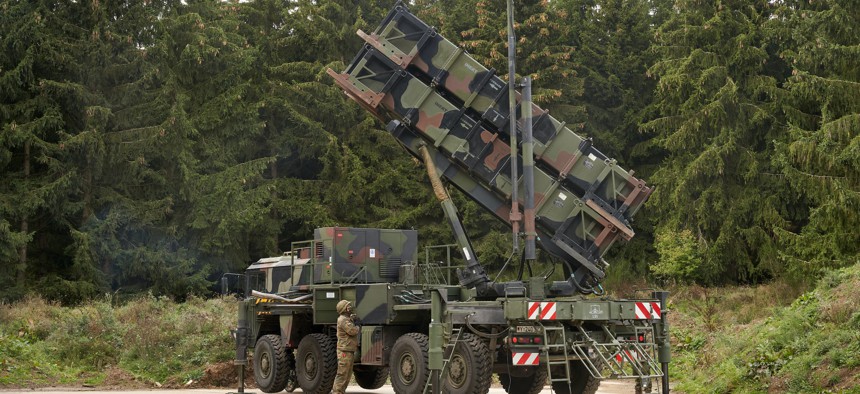
A Patriot air defense system launcher is set up during exercise Resilient Guard 2020, Oct. 14, 2020, in Germany. Picture alliance via Getty Images / Thomas Frey
Why the US Won’t Give Patriot Interceptors to Ukraine
The Pentagon is still hunting “alternative options” to bolster Ukraine’s air defenses against Russia’s brutal strikes.
Pentagon officials will not send the advanced Patriot air-defense system to Ukraine, saying Thursday that U.S. forces would need to enter Ukraine to operate it, which is a non-starter for the Biden administration.
The decision comes one day after U.S. officials rejected a proposal from Poland to have the United States and NATO transfer Polish MiG-29 fighter jets to Ukraine.
“There's no discussion about putting a Patriot battery in Ukraine. In order to do that you have to put U.S. troops with it to operate it,” a senior defense official said Thursday. “It is not a system that the Ukrainians are familiar with and as we have made very clear, there will be no U.S. troops fighting in Ukraine.”
A Patriot missile battery usually has about 90 U.S. soldiers attached to it. Each system includes a phased array radar, a control station, and eight launchers, each of which can hold four missiles. Patriot “is the only operational air defense system that can shoot down attacking missiles,” according to the Army.
It would likely take months to train the Ukrainian military how to operate the system, according to people familiar with the technology.
“It takes a long time to be a Patriot operator,” said Thomas Karako, a missile defense expert with the Center for Strategic and International Studies, or CSIS, a think tank in Washington.
Ukrainian president Volodymyr Zelenskyy has urged the West to send additional surface-to-air defenses. Russia has escalated a brutal assault on Ukrainian civilians and military targets that is relying heavily on long-range missiles and rockets, partly because of the local resistance and logistical failures their ground forces encountered.
As of Thursday, Russia had launched approximately 775 missiles into Ukraine, increasingly targeting civilians and devastating residential areas, according to U.S. officials.
“The Kremlin bombs schools, hospitals and maternity wards. Moscow does not protect anyone. She's the destroyer,” the Navy of the Armed Forces of Ukraine wrote on its official Facebook page. “They are not capable of fighting with our army, guard, territorial defense forces This is why the most vulnerable are attacked.”
Ukraine’s military already operates the Russian-made S-300 air defense system. Some newer variants of the S-300 are capable of “providing some cruise and ballistic missile defense capability,” according to CSIS.
“The Russian air defense units … operated by the Ukrainians, they're pretty capable systems,” Gen. Mark Kelly, the head of the U.S. Air Force’s Air Combat Command, said Wednesday at the McAleese and Associates Defense Programs conference in Washington.
Sending additional Soviet-era S-300 interceptors owned by NATO allies to Ukraine is one of the options under consideration, the Wall Street Journal reported Thursday. Bulgaria and Slovakia possess S-300s, according to Military Periscope, a weapons database owned by Defense One parent GovExec.
“Lethality is the top priority for the Ukrainians right now,” said Josh Kirshner, a former State Department official now with Beacon Global Strategies. “But at the same time they need systems that they can learn to use quickly and are ready to ship. Clearly, they don’t have the personnel to spare for long training efforts or time to waste.”
Israel reportedly blocked the United States from giving Iron Dome missile interceptor systems to Ukraine out of fear upsetting Moscow. Iron Dome has been widely effective in shooting down thousands of rockets fired from Gaza, but Israel historically has balked at sharing the technology with other countries, including South Korea.
In the meantime, the Ukrainian military has successfully attacked Russian forces using Turkish TB2 drones.
“At this point, they need everything they can get,” Karako said.
Pentagon spokesman John Kirby said Wednesday that the U.S. was exploring other ways to better enable Ukraine to defend against the air assault, after rejecting a proposal by Poland to take its Soviet-era MiG-29s and get them into Ukrainian hands.
“Alternative options are working with other allies and partner nations around the world who may have additional air defense capabilities and systems at their disposal who might be willing to provide them to Ukraine,” Kirby said. “And so we're having discussions with many countries right now about some of those capabilities, surface-to-air missiles for instance, that the Ukrainians are more trained and more equipped [on].”
Russia warned earlier this week that any country that took part in transferring jets to Ukraine would be seen as party to the conflict, and Kirby said Wednesday that the U.S. intelligence community had assessed that a jet transfer would be “high risk” for escalating into a direct war between NATO and Russia, while not making an appreciable difference in the air war.
Some lawmakers on the Senate Intelligence Committee on Thursday demanded to know the intelligence behind the Biden administration’s claims that providing Ukraine with more advanced weapons would cause Russia to escalate the war.
On Thursday, the Pentagon said that Ukrainian pilots “are not flying their fixed wing aircraft very much on a daily basis” because Russia has almost the entire country covered by its own surface-to-air missile defense systems.






